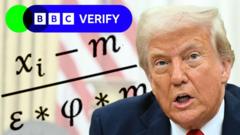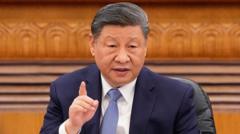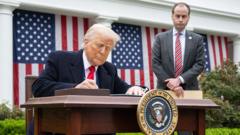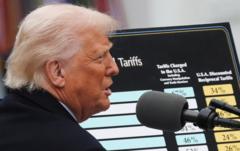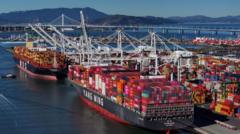As Trump gears up for a wide-ranging announcement on new tariffs dubbed "Liberation Day," uncertainty persists around their potential size, affected countries, and overall economic repercussions.**
Uncertainty Looms as Trump Prepares to Announce "Liberation Day" Tariffs**
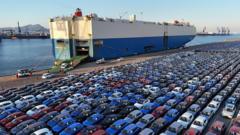
Uncertainty Looms as Trump Prepares to Announce "Liberation Day" Tariffs**
With rising tensions in global trade, President Trump's imminent tariff announcement raises several pressing questions regarding economic impact and international relations.**
As the clock ticks down to President Trump's anticipated tariff announcement known as "Liberation Day," significant uncertainty remains regarding the specifics of the proposed import taxes. Trump has consistently communicated his commitment to imposing higher tariffs, particularly on imports from China, steel, aluminum, and select goods from Canada and Mexico. This week, he is expected to unveil details of a broader tariff strategy that has been shaping up in his administration over recent weeks.
The White House has not disclosed potential tariff rates, though experts speculate ranges from 10% to as high as 60% for certain imports. Trump's frequent advocacy for "reciprocal" tariffs adds complexity, suggesting that imported goods could be taxed variably based on the charges imposed by other countries. The inclusion of other trade policies, such as Value Added Tax (VAT) considerations, further complicates the landscape as stakeholders brace for the forthcoming announcement.
International responses vary, with many businesses and political leaders scrambling for clarity about the financial implications and how they might coexist with existing tariffs, such as those levied on steel and aluminum. For instance, Europe faces the prospect of steep tariffs, and President Trump has hinted at a 25% import tax on European goods.
As the specific countries impacted remain unconfirmed, speculation surrounds whether the tariffs will affect all nations uniformly or be more selectively applied. Early comments from Trump suggest a comprehensive approach, potentially undermining earlier hopes from countries like the United Kingdom that might have hoped to remain exempt.
While tariffs are taxes that ultimately burden importing firms, the broader implications could ripple through the economy, with firms potentially needing to raise consumer prices to mitigate the cost. This reality raises concerns about demand erosion, with possible recessionary risks extending beyond US borders as many international firms depend on US sales. Trump's assertive remarks suggest a harsh re-evaluation of trade relationships, even with historical allies, which could chart a new and unpredictable course in global trade dynamics.










